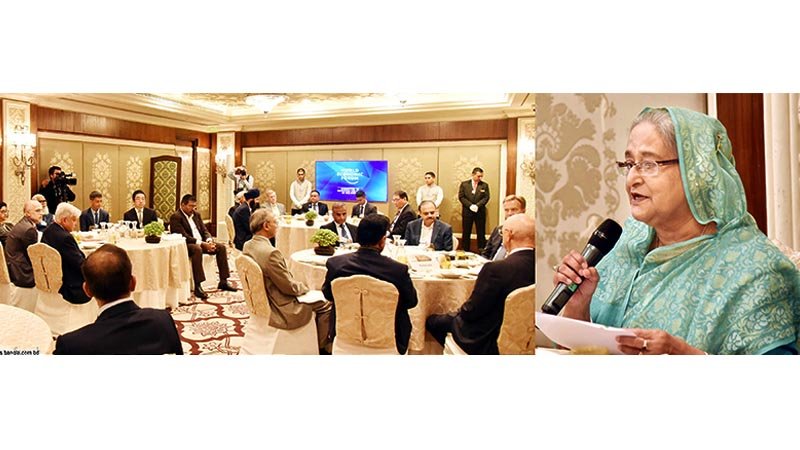Bangladesh invites diverse investment: PM


Prime Minister Sheikh Hasina on Thursday projected Bangladesh as a lucrative economic hub between South Asia, China and South-East Asia connecting a landmass to a combined market of more than three billion people and invited foreign investment in diverse sectors in her country like artificial intelligence, automotive industry, electronics, light engineering and education.
Speaking at the India Economic Summit of the World Economic Forum here this afternoon, she said Bangladesh “is fast moving to be a high-value, knowledge-intensive society, beyond apparel manufacturing.” Hasina’s speech at the Summit set the tone and tenor of her four-day official visit to India, her first since her re-election as PM in December last year, whose primary focus would be on further strengthening economic relations and to woo foreign investment. With the same objective, Hasina will be meeting the CEOs of top Indian companies on Friday.
Pointing out that Bangladesh exported 12 industrial robots to Korea and that four ships made in Bangladesh have come to India and that leading Indian industrial house Reliance recently purchased a large number of refrigerators made in Bangladesh, Hasina added that the country has six lakh IT freelancers, “the largest freelancing community.”
These “speak of a quiet transformation where people have taken risks and faced challenges by adopting to innovation and technology. It is the time for global investors, particularly Indian entrepreneurs, to invest in Bangladesh in areas like education, light engineering, electronics, automotive industry, artificial Intelligence –beyond the conventional menu,” she said.
She told the Summit attended by several CEOs of multinational and Indian firms that Bangladesh offered ‘the most liberal investment regime’ in South Asia in terms of legal protection of foreign investment, generous fiscal incentives, concession on machinery import, unrestricted exit policy, full repatriation of dividend and capital on exit.
“We are establishing 100 Special Economic Zones, with one-stop service across Bangladesh. Twelve of the Zones are already functioning. Two zones are reserved for Indian investors. A number of High-Tech Parks are also ready for technology and innovative enterprises,” the Prime Minister said. Projecting the much bigger economic spin-offs of Bangladesh’s geographical location, Hasina said that “in between Eastern and North-East India, China on the West and South-East Asia, Bangladesh merits attention of global and Indian business as a seamless economic space. We can serve as the economic hub for the sub-region. Beyond our own 162 million people, Bangladesh can be the connecting landmass to a combined market of nearly 3 billion people.”
She said Bangladesh is seen by many as ‘a market’ of over 30 million middle and affluent class population and a ‘development miracle’. However, “to me, our strengths are the societal values and peoples’ trust in Bangladesh. Equally, peoples’ aspiration to progress and their resilience as well as their confidence in our leadership,” Hasina said.
Recalling that the HSBC had last year predicted Bangladesh to be the 26th largest economy in the world by 2030, she said “two things are key: one is our open society, religious harmony, liberal values, secular culture. The other is that two-third of our homogenous population is young – mostly under 25. They are fast skill-able, adaptive to technologies, ready to engage at competitive wages.”
Hasina said Bangladesh offered foreign investors a stable and humanitarian state where the leadership is responsive and responsible. That, coupled with sound macro-economic fundamentals, pragmatic and open economy would continue to set global trends and examples of a peaceful and progressive nation, she added.
Hasina said Bangladesh is urbanizing fast and by 2030, about 48% of its population will live in towns and cities most of whom will be young, energetic and digitally connected, agile, receptive to new ideas and look for new ways of creating wealth. “In fact, this is already happening with over 110 million active internet subscribers in Bangladesh,” she said and pointed out that by 2025, mobile internet penetration will reach 41% of the population. “Rapid urbanization fed by increasing consumption of electricity and over 30 million middle class is indeed a huge market,” she said.
Hasina said her father, the Father of the Nation Bangabandhu Sheikh Mujibur Rahman dreamt of a “golden Bangladesh” free from hunger, poverty and exploitation. “His vision gives us the confidence to move with our vision to develop Bangladesh as a developing country by 2021 and a developed one by 2041,” she remarked.
Acknowledging that Bangladesh too has challenges like many other countries, she said “but we know how to transform challenges into opportunities.” “This year, our economy posted a record high growth of 8.1%. We are close to achieving double digit growth. Since 2009, Bangladesh economy has grown by 188% in size. Our per capita income is around US$ 2000,” said Hasina.
She said Bangladesh agriculture is no longer a subsistence one. “Beyond self-sufficiency, we are now the 4th largest in rice production, 2nd in jute, 4th in mango, 5th in vegetable production and 4th in inland fisheries, in the world. We are decoding genome of key crops and fruits to move further. Referring to her government’s `Digital Bangladesh’ initiative since 2009, she said, “We have ensured 100% ICT access for people at the grassroots.
Our focus is to employ technology to solve common people’s developmental challenges. As a result, Bangladesh has the 5th largest internet user population in the Asia-Pacific.” Hasina said Bangladesh is “fast moving towards a cashless society” and last year, e-commerce transactions reached 260 million dollars. On Saturday, Hasina will hold talks with Prime Minister Narendra Modi after which the two countries are set to sign at least ten agreements in a range of areas.
The two Prime Ministers will also jointly inaugurate three projects via video conferencing.


